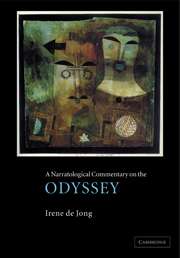Book contents
- Frontmatter
- Contents
- Preface
- Glossary
- Commentary
- Book One
- Book Two
- Book Three
- Book Four
- Book Five
- Book Six
- Book Seven
- Book Eight
- Book Nine
- Book Ten
- Book Eleven
- Book Twelve
- Book Thirteen
- Book Fourteen
- Book Fifteen
- Book Sixteen
- Book Seventeen
- Book Eighteen
- Book Nineteen
- Book Twenty
- Book Twenty-one
- Book Twenty-two
- Book Twenty-three
- Book Twenty-four
- Appendix A
- Appendix B
- Appendix C
- Appendix D
- Appendix E
- Appendix F
- Bibliography
- Index of Greek words
- Index of subjects
Book Four
Published online by Cambridge University Press: 23 March 2010
- Frontmatter
- Contents
- Preface
- Glossary
- Commentary
- Book One
- Book Two
- Book Three
- Book Four
- Book Five
- Book Six
- Book Seven
- Book Eight
- Book Nine
- Book Ten
- Book Eleven
- Book Twelve
- Book Thirteen
- Book Fourteen
- Book Fifteen
- Book Sixteen
- Book Seventeen
- Book Eighteen
- Book Nineteen
- Book Twenty
- Book Twenty-one
- Book Twenty-two
- Book Twenty-three
- Book Twenty-four
- Appendix A
- Appendix B
- Appendix C
- Appendix D
- Appendix E
- Appendix F
- Bibliography
- Index of Greek words
- Index of subjects
Summary
Book 4 contains the evening of the fifth day and the sixth day, which bring Telemachus' stay with Menelaus in Sparta (1–624; this will be followed by an epilogue in Book 15) and the reaction on Ithaca to Telemachus' departure (625–848); cf. Appendix A.
The goal of Telemachus' trip is attained in this book, in that he finally hears where his father is. This climactic moment is postponed until the very last moment, via a series of retardations †. In the first conversation between host and guest, Pisistratus broaches the subject of the reason for Telemachus' visit (162–7), but this is ‘forgotten’ by Menelaus and only picked up the next morning, in the second conversation (312–31); an instance of the interruption technique †. When Telemachus asks him for information about his father, Menelaus promises to tell him what the Old Man, Proteus, told him (347–50), but first embarks on a lengthy tale about his own Egyptian adventures. Not until halfway through this story does Proteus enter the story and announces that he will inform Menelaus about the fate of three Troy veterans (496–8), tells about Ajax and Agamemnon, but only after a reminder from Menelaus (551–3) finally discloses what he knows about the third man, Odysseus (555–60). Telemachus' knowledge now almost equals that of the narratees, who have known from 1.13–15 on that Odysseus is with Calypso.
- Type
- Chapter
- Information
- A Narratological Commentary on the Odyssey , pp. 89 - 122Publisher: Cambridge University PressPrint publication year: 2001



